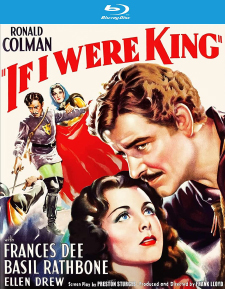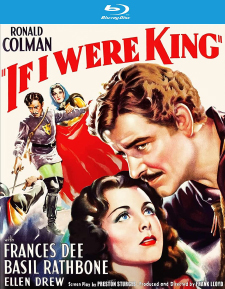If I Were King (1938) (Blu-ray Review)

Director
Frank LloydRelease Date(s)
1938 (February 7, 2023)Studio(s)
Paramount Pictures (Kino Lorber Studio Classics)- Film/Program Grade: A
- Video Grade: A
- Audio Grade: A-
- Extras Grade: B
Review
If I Were King is a fictionalized drama about 15th century poet Francois Villon, who has a penchant for getting himself into trouble and eventually matches wits with the king. It was made when adventure films were favorites of moviegoers and among the regular output of the studios.
Paris is surrounded by the forces of the Duke of Burgundy, which far outnumber the besieged Parisians. The duke’s plan is to starve the Parisians into submission and claim the throne. King Louis XI (Basil Rathbone, The Hound of the Baskervilles) has been hoarding food supplies for himself and the nobles, leaving the common people of Paris to starve and grumble against the king. Only one person, gifted poet and speaker Francois Villon (Ronald Colman, Lost Horizon), is brave and clever enough to hijack some of the king’s food stores for the people. He’s also the only one who understands that supplying the needs of the commoners will buy the king their goodwill, loyalty, and willingness to fight for him.
Pursued to a tavern by the king’s guards after leading a raid on the storehouses, Villon is confronted by Louis himself. Ordinarily, he would condemn the poet to torture and death, but Villon has also done the king a great service by discovering and killing a traitor in Louis’ army. In discussing his dilemma with his prisoner, Louis becomes interested in Villon’s notion that ruling through kindness and compassion rather than fear is more likely to inspire loyalty. Still, the king is skeptical. To show Villon that ruling is no easy task, Louis appoints him Constable of France, in command of the military and the police and chief judge of the kingdom.
Villon dispenses justice fairly and liberates food supplies to the people in the name of the king, turning their hatred of him to loyalty. But now that the generals are learning how it feels to go hungry, they are planning to surrender rather than fight. With all this court intrigue, Villon finds time to win over the queen’s lady-in-waiting Katherine DeVaucelles (Frances Dee) with his poetic wooing.
With a witty screenplay by Preston Sturges and fast-paced direction by Frank Lloyd, If I Were A King is a highly entertaining swashbuckler with outstanding production values. Opulent sets, hundreds of extras in crowd scenes, and excellent performances by the two male leads represent the studio system at its best.
Colman, who had started his screen career in silent pictures, provides just the right combination of derring-do, sensitivity, and charm as Villon. A rascal at heart, Villon is able to persuade the king with logic while also showing deference. He is a master of wordsmanship and uses it both to converse on an equal basis with the king and to coo romantically to Lady Katherine. Colman’s voice is musical in the way he delivers his dialogue with carefully modulated tones and emphases. His sensitive reading of the romantic moments make his unexpected jokes all the more delightful. Looking far younger than his 48 years, Colman handles the physical as well as the verbal demands of the role skillfully. Colman’s Villon is a more intellectual version of the swashbuckler character than Errol Flynn as Robin Hood. Both are handy with a sword and sympathetic to the poor and oppressed, but Villon is a deep thinker and knows not every battle can be won with weapons.
The pure joy of this film is Basil Rathbone’s performance as Louis XI. With a hunched posture, quivering lips, suspicious glance, and high-pitched cackle of a voice, he takes tiny steps, shuffling his way across the room. His is a wonderfully rich performance. Rathbone’s career is filled with costume pictures in which he played the villain. But here he has the chance to play a more complex character and he delves into the role with devilish relish. He adds immeasurably to the film’s success and was rightfully nominated for a Best Supporting Actor Academy Award.
The verbal sparks between Colman and Rathbone are highlights of this adventure tale that combines action, romance, and comedy for a completely engaging experience. Francis Villon was also the subject of The Beloved Rogue (1927), starring John Barrymore, and two versions of the musical The Vagabond King (1930 and 1956).
If I Were King’s supporting cast includes Ellen Drew as a woman of the streets, Henry Wilcoxin as Captain of the Watch, C.V. France as Father Villon, and Heather Thatcher as the Queen. Character actors Stanley Ridges, Sidney Toler, and Bruce Lester are also in the cast.
If I Were King was shot by director of photography Theodor Sparkuhl on 35 mm black-and-white film with spherical lenses and presented in the aspect ratio of 1.37:1. Kino Lorber’s Blu-ray release is sourced from a new 2K master and displays a radiance in brighter scenes and excellent detail in shadowy sequences. Contrast is very good and details are nicely delineated in clothing patterns, jewelry and ornamentation, bricks in walls, and furnishings in the palace. High-angle shots are used to show Villon running from his pursuers, and process photography is incorporated to suggest the Burgundian army entrenched outside the walls of Paris.
The soundtrack is English 2.0 mono DTS-HD Master Audio. English SDH subtitles are an available option. Dialogue, so important in this film, is clear and distinct throughout. Colman’s voice is particularly musical, with its varied cadences and shifts in emphasis. Rathbone’s cackle for Louis XI is hysterical, since the actor’s deep, resonant voice is so well known. Battle scenes feature shouting crowds, clinking swords, and hand-to-hand fighting. Richard Hageman’s score is best during action scenes but doesn’t approach the grandeur of Franz Waxman’s or Erich Wolfgang Korngold’s action movie music.
Bonus materials include the following:
- Audio Commentary by Julie Kirgo
- If I Were King Trailer (2:10)
- Beau Geste Trailer (1:28)
- Union Pacific Trailer (1:28)
- Arabian Nights Trailer (2:07)
- Reap the Wild Wind Trailer (2:17)
- Against All Flags Trailer (2:25)
Film historian and writer Julie Kirgo notes that Frank Lloyd was the second director to win a Best Director Oscar (for The Divine Lady). He was both producer and director of If I Were King. Other Lloyd films are Cavalcade (1934) and Mutiny on the Bounty (1935), the latte of which won the Best Picture Academy Award. Preston Sturges is the author of If I Were King. The film is about a real-life character and is based on a play. Background facts are provided about Francois Villon and one of his famous lines—“Where are the snows of yesterday?”—is quoted. Villon was well educated but preferred the life of a rogue. He was a thief and very violent. He was eventually banished from Paris and disappeared into obscurity. Ronald Colman was English, started his career on the stage, became popular in silent films, and made one of the great screen romantic teams with Vilma Banky. He was famous for his melodic voice and on-screen charm and flourished when sound came in. Edith Head, at the beginning of her career, designed the costumes for If I Were King and was equally adept at creating elaborate clothes for the nobles and tatters for the common folk. Rathbone turns in a comic performance. His most famous role was that of Sherlock Holmes, a character he played in 14 films. He referred to the role as both a “blessing and a curse,” since he longed to take on diverse parts. He had a thriving career in film, on the stage, on radio, and on television. Considerable detail is provided for Preston Sturges, “a man with enormous, restless creativity.” In addition to being a writer, he invented many objects, none of which caught on. His first play, The Guinea Pig, provided him entry into Hollywood, and he had a string of unprecedented hits from 1939 into the 1940s, including The Great McGinty, Sullivan’s Travels, Miracle of Morgan’s Creek, and The Palm Beach Story.
The best scenes in If I Were King are between Colman and Rathbone as they each try to one-up the other. The repartee is clever and the actors make the most of it with their distinctive line readings. Screenwriter Preston Sturges, who was fluent in French, incorporated translations of Villon’s poetry. He isn’t afraid to humanize King Louis while portraying Villon as a romantic rogue who sees simple solutions that defy others. Director Frank Lloyd knows how to exploit Rathbone’s ability and imagination to create a memorable monarch. If I Were King has an epic feel and is a delightful example of studio Golden Age filmmaking.
- Dennis Seuling

